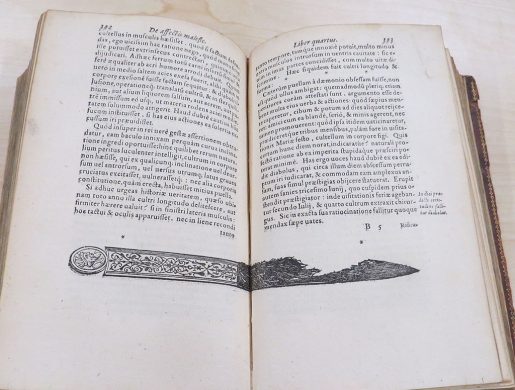
“De praestigiis Daemonum” by Johann Weyer (Basil 1563)
This year is the 460th anniversary of the publishing of “De praestigiis Daemonum” (“On the Tricks of the Devil”), written by Dutch physician Johann Weyer (1515-1588). This book is one of the gems in our collection.
This book came to Falk Library from the former library of the Western Psychiatric Institute and Clinic. It is a well-preserved book bound in leather, though it does not have illustrations or other provenance notes worth mentioning. It was, however, an important stand against the prosecution of witches and against the followers of the official and widely accepted manual of dealing with witch trials, “Malleus Maleficarum.” Weyer claimed that it is not demons or supernatural powers, but rather melancholy and other mental problems, that lay at the source of perceived witchcraft epidemics – and that such mental problems called for physician involvement, not for an executioner.
George Mora wrote of Weyer’s significance for today’s psychiatry on the 400th anniversary of “De praestigiis Daemonum.” His interpretation pointed to several landmarks of the discipline that Weyer touched upon, such as psychiatric examination, recognition of a therapeutic relationship, contributions to legal psychiatry, input on nosology and diagnosis, and his pioneering views on what would become pastoral psychology. Weyer’s book challenged the views of his contemporaries, and it was not well received or understood by his peers (except for a very few, like Reginald Scot, 1584). Weyer’s work was criticized and rejected. It had to wait until the advent of modern psychiatry for the medical world to be ready to see its novelty and to re-evaluate its significance.

Later works also brought different evaluations of Weyer. Thomas J. Shoeneman, in his article “The role of mental illness in the European witch hunts of the sixteenth and seventeenth centuries: An assessment,” criticized the earlier evaluations of Weyer and downplayed his role. However, that does not change my appreciation of “De praestigiis Daemonum.” Johann Weyer pointed out the condition of the human mind and the need to treat it during illness, within the context of witch hunts. Does it have to be only about witchcraft? If you leave out the old context, this book could be about any catastrophic event that wreaks havoc in society and leaves marks on our mental health.
~Małgorzata Fort